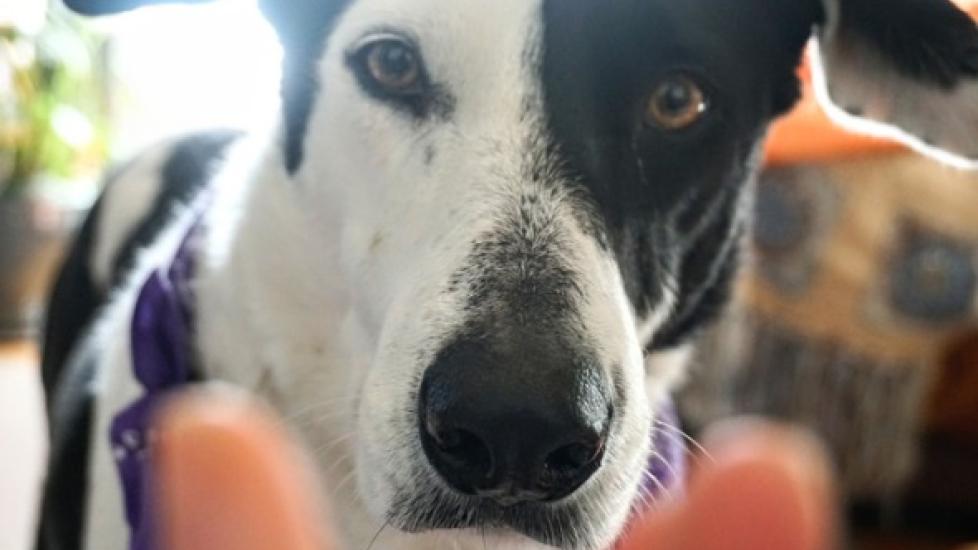Why Is My Dog So Clingy?
Does your dog always follow you around, never leaving your side? Is their attention always focused on you?
You may have what’s called a “Velcro dog.” Let’s find out what this means and whether you should be worried about your dog’s clingy behavior.
What Are Velcro Dogs?
If you answered “yes” to any of the previous questions, it's likely that you have a clingy dog. Some refer to clingy dogs as “Velcro dogs” (named after VELCRO®) because it’s as if your dog is attached to you.
Although clingy dog behavior can be endearing, it can also be frustrating, especially when your dog just won't leave you alone—even for a minute!
Why Is My Dog So Clingy?
There are several reasons why your dog may be clingy. It may just be a learned behavior, or it may be a sign of an issue. The best option is to make an appointment with your veterinarian so you can work together to determine the cause for your dog’s clinginess.
Here are some common reasons why dogs can be clingy:
Learned Behavior
Clinginess in dogs is often a learned behavior. Dogs learn this behavior from humans by the way we interact with them. If you always give your dog food when they follow you into the kitchen, or you pet them every time they lie next to you, you're teaching them that following you leads to some type of reward.
If you give puppies constant attention when they're developing, they can become fearful of being alone and subsequently never want to leave your side.
Illness or Aging
Older dogs with vision or hearing loss, or those experiencing cognitive decline, can suddenly become clingy because their world is becoming unfamiliar to them.
Dogs who are ill or bored can also become clingy. Talk to your vet to understand what might be causing the sudden clingy behavior.
Anxiety and Stress
Dogs who have anxiety issues often develop clingy dog behaviors. Interestingly, dogs can also become clingy if they sense our stress or anxiety.
Dogs can also become clingy if you change their daily routine or make changes in the home or household that cause them stress.
Clingy Dog Breeds
As if all of these reasons weren't enough, some dog breeds are prone to clinginess. For example, lapdogs, like Shih Tzus, tend be needy dogs. Also, working dogs, who are trained to be dependent, can become clingy.
Separation Anxiety
Clinginess in dogs can also signal a bigger behavioral problem: separation anxiety. It’s important to know how to differentiate between a clingy dog and a dog with separation anxiety so you know how to best manage the behavior. You will need the help of your veterinarian or a veterinary behaviorist for this.
Clinginess and separation anxiety are similar but not exactly the same. Generally, what separates them is how a dog reacts to being away from their person or people.
Clingy dogs want to be around you when you're at home, but they don't panic when you're not there. A dog with separation anxiety panics when you're not around.
Separation anxiety causes dogs to engage in destructive, anxious behavior when left alone. Such behavior includes incessant whining, pacing, destructive chewing, and urinating or defecating in the home.
Clinginess becomes a problem when it progresses to separation anxiety. If a clingy dog starts becoming anxious or panicky when left alone, it's time to suspect separation anxiety and seek professional behavioral help.
A veterinary behaviorist can help you implement behavioral modifications to reduce the anxiety. Fortunately, not all clingy dogs develop separation anxiety.
How to Help Your Dog Be Less Clingy
If you have a clingy dog without separation anxiety, there are ways you can teach them to become more independent. Here are several strategies that can help reduce a dog's clinginess.
- Increase exercise. A good bout of physical activity will tire your dog enough to where they have little interest in following you around. Make sure the exercise is appropriate for your dog’s age and health history. Consult your veterinarian for appropriate exercises for your dog.
- Stimulate their mind. A bored dog may become clingy because they don't have anything better to do. Interactive toys keep dogs mentally stimulated and encourage independent play.
- Create a special space. Set up a space with your dog's bed and favorite toys where your dog can go instead of following you around. Train your dog to go to this area with a cue like, "Go to your special space," and immediately reward them with a treat when they go there.
- Desensitize your dog to your movements. Your dog has probably associated certain movements (e.g., going to the kitchen, grabbing your keys) with you rewarding or leaving them. To "normalize" these movements, practice doing them without actually going through with the normal activity that goes with them.
For example, go to the kitchen and start sweeping instead of getting food out, or grab your keys and turn on the TV instead of leaving the house. Eventually, your dog will learn that your movements don't warrant much or any attention.
How to Help Clingy Senior Dogs
Aging dogs with vision loss can sometimes benefit from adding night-lights in dark areas. Also, keep the general setup of your home and furniture the same. Dogs with sight loss tend to learn their way around their environment through their other senses but can get confused when even a chair is in a different place.
Certain foods and supplements have been shown to help with cognitive function in dogs, such as omega-3 and omega-6 fatty acids.
Finally, puzzle toys and other methods of mental stimulation have been proven to stimulate neurons in the brain, supporting cognitive function.
If these strategies do not reduce your dog's clinginess, consult either your veterinarian or a veterinary behaviorist for further guidance.
Featured Image: iStock.com/Kesinee Khaikaew
Help us make PetMD better
Was this article helpful?
